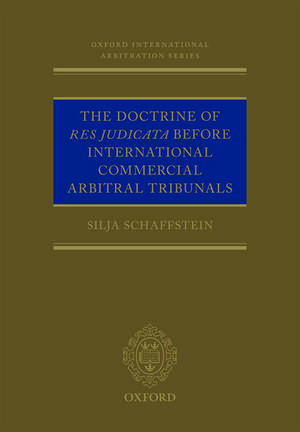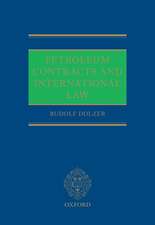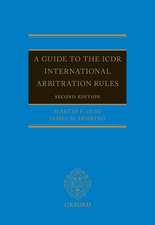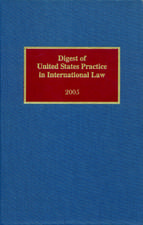The Doctrine of Res Judicata Before International Commercial Arbitral Tribunals: Oxford International Arbitration Series
Autor Silja Schaffsteinen Limba Engleză Hardback – 24 mar 2016
Din seria Oxford International Arbitration Series
- 14%
 Preț: 610.34 lei
Preț: 610.34 lei - 34%
 Preț: 1320.80 lei
Preț: 1320.80 lei - 34%
 Preț: 1203.92 lei
Preț: 1203.92 lei - 25%
 Preț: 1278.00 lei
Preț: 1278.00 lei - 30%
 Preț: 1197.11 lei
Preț: 1197.11 lei - 30%
 Preț: 1458.79 lei
Preț: 1458.79 lei - 29%
 Preț: 975.60 lei
Preț: 975.60 lei - 34%
 Preț: 744.96 lei
Preț: 744.96 lei - 23%
 Preț: 869.83 lei
Preț: 869.83 lei - 29%
 Preț: 1060.43 lei
Preț: 1060.43 lei - 23%
 Preț: 2322.74 lei
Preț: 2322.74 lei - 34%
 Preț: 1624.33 lei
Preț: 1624.33 lei - 34%
 Preț: 1583.80 lei
Preț: 1583.80 lei - 34%
 Preț: 1580.70 lei
Preț: 1580.70 lei - 31%
 Preț: 1670.29 lei
Preț: 1670.29 lei - 31%
 Preț: 1406.84 lei
Preț: 1406.84 lei - 34%
 Preț: 1327.22 lei
Preț: 1327.22 lei - 34%
 Preț: 1010.43 lei
Preț: 1010.43 lei - 34%
 Preț: 1017.30 lei
Preț: 1017.30 lei - 31%
 Preț: 1054.91 lei
Preț: 1054.91 lei - 30%
 Preț: 1013.78 lei
Preț: 1013.78 lei - 29%
 Preț: 1087.21 lei
Preț: 1087.21 lei
Preț: 1260.70 lei
Preț vechi: 1825.77 lei
-31% Nou
Puncte Express: 1891
Preț estimativ în valută:
241.26€ • 261.98$ • 202.66£
241.26€ • 261.98$ • 202.66£
Carte tipărită la comandă
Livrare economică 11-17 aprilie
Preluare comenzi: 021 569.72.76
Specificații
ISBN-13: 9780198715610
ISBN-10: 0198715617
Pagini: 368
Dimensiuni: 186 x 247 x 25 mm
Greutate: 0.78 kg
Editura: OUP OXFORD
Colecția OUP Oxford
Seria Oxford International Arbitration Series
Locul publicării:Oxford, United Kingdom
ISBN-10: 0198715617
Pagini: 368
Dimensiuni: 186 x 247 x 25 mm
Greutate: 0.78 kg
Editura: OUP OXFORD
Colecția OUP Oxford
Seria Oxford International Arbitration Series
Locul publicării:Oxford, United Kingdom
Recenzii
Few tasks provide the analytic challenge inherent in articulation of when and why a prior judgment or award will (or should) take binding effect before an arbitral tribunal. The superb treatise by Silja Schaffstein offers a stimulating study of res judicata in international arbitration, examining analogues in national litigation, public international law and conflicts-of-law principles. Comprehensive and thoughtful, her book will assist both scholars and practitioners in grappling with a subject that continues to resist facile solutions.
In times of an ever-increasing number of parallel and satellite proceedings in international arbitration, the question of a decisions res judicata effect on any future proceeding across national frontiers has reached key importance. As there is no uniform approach to dealing with this issue in national codes of civil procedure or arbitration laws, the need for the development of a transnational standard cannot be overstated. Dr Schaffstein's remarkable treatise offers a welcome contribution to such a development. At the same time, it is a useful guide for practitioners, encountering specific questions in regard to res judicata in international arbitral practice. As such, the study is an indispensable addition to any library on international arbitration.
The doctrine of res judicata is increasingly invoked in international arbitral proceedings. It is not enough that a prior award or judgment is worthy of recognition in order to be given res judicata effect; all systems of law impose additional requirements including, but not limited to, certain "identities," and these requirements are by no means identical across legal systems. Their content depends on a choice of law analysis, with selection of the applicable law potentially outcome-determinative. Silja Schaffstein's new book, The Doctrine of Res Judicata before International Commercial Arbitral Tribunals does long overdue justice to a topic that has received all too little sustained attention in the literature and jurisprudence alike. It will rightly guide all future treatments of the subject.
Schaffstein's careful analysis of the present situation and meaningful proposals on ways to approach the situation going forward arrive at an opportune time in the midst of this debate Her work as a whole can be considered an important new asset to arbitration practitioners which will greatly facilitate the promulgation of what should today be considered the correct approach to the issue of res judicata in arbitration. In particular, the rules she has proposed will be a very valuable tool for arbitrators who decide to follow the transnational path when rendering a decision on res judicata.
Dr. Schaffstein's treatise on res judicata in international commercial arbitration is a highly valuable contribution to an aspect of international arbitration law with delicate theoretical implications and great practical relevance ... It will certainly become a starting point for any analysis of the res judicata effects of awards, especially by arbitral tribunals, and should contribute to a shared approach to the subject.
Increasingly, parties raise and oppose the conclusive or preclusive effect of national and transnational doctrines of res judicata which may control or at least influence the decision making processes of international arbitration tribunals. This book provides a valuable guide to the theories and practical applications of res judicata in international commercial arbitration, an excellent and topical subject on which there is little other substantial publication.
Silja Schaffstein's new book sheds light on the complex questions that arise in this context through a thorough analysis of the approaches taken in common and civil law jurisdictions, international law, and commercial arbitral jurisprudence. Her insights and the suggestion of transnational rules for the principle's application will be extremely useful for arbitration practitioners and make a highly welcome contribution to the debate in this field.
In times of an ever-increasing number of parallel and satellite proceedings in international arbitration, the question of a decisions res judicata effect on any future proceeding across national frontiers has reached key importance. As there is no uniform approach to dealing with this issue in national codes of civil procedure or arbitration laws, the need for the development of a transnational standard cannot be overstated. Dr Schaffstein's remarkable treatise offers a welcome contribution to such a development. At the same time, it is a useful guide for practitioners, encountering specific questions in regard to res judicata in international arbitral practice. As such, the study is an indispensable addition to any library on international arbitration.
The doctrine of res judicata is increasingly invoked in international arbitral proceedings. It is not enough that a prior award or judgment is worthy of recognition in order to be given res judicata effect; all systems of law impose additional requirements including, but not limited to, certain "identities," and these requirements are by no means identical across legal systems. Their content depends on a choice of law analysis, with selection of the applicable law potentially outcome-determinative. Silja Schaffstein's new book, The Doctrine of Res Judicata before International Commercial Arbitral Tribunals does long overdue justice to a topic that has received all too little sustained attention in the literature and jurisprudence alike. It will rightly guide all future treatments of the subject.
Schaffstein's careful analysis of the present situation and meaningful proposals on ways to approach the situation going forward arrive at an opportune time in the midst of this debate Her work as a whole can be considered an important new asset to arbitration practitioners which will greatly facilitate the promulgation of what should today be considered the correct approach to the issue of res judicata in arbitration. In particular, the rules she has proposed will be a very valuable tool for arbitrators who decide to follow the transnational path when rendering a decision on res judicata.
Dr. Schaffstein's treatise on res judicata in international commercial arbitration is a highly valuable contribution to an aspect of international arbitration law with delicate theoretical implications and great practical relevance ... It will certainly become a starting point for any analysis of the res judicata effects of awards, especially by arbitral tribunals, and should contribute to a shared approach to the subject.
Increasingly, parties raise and oppose the conclusive or preclusive effect of national and transnational doctrines of res judicata which may control or at least influence the decision making processes of international arbitration tribunals. This book provides a valuable guide to the theories and practical applications of res judicata in international commercial arbitration, an excellent and topical subject on which there is little other substantial publication.
Silja Schaffstein's new book sheds light on the complex questions that arise in this context through a thorough analysis of the approaches taken in common and civil law jurisdictions, international law, and commercial arbitral jurisprudence. Her insights and the suggestion of transnational rules for the principle's application will be extremely useful for arbitration practitioners and make a highly welcome contribution to the debate in this field.
Notă biografică
Dr Silja Schaffstein, Lévy Kaufmann-Kohler, Attorneys-At-Law in Geneva.


















